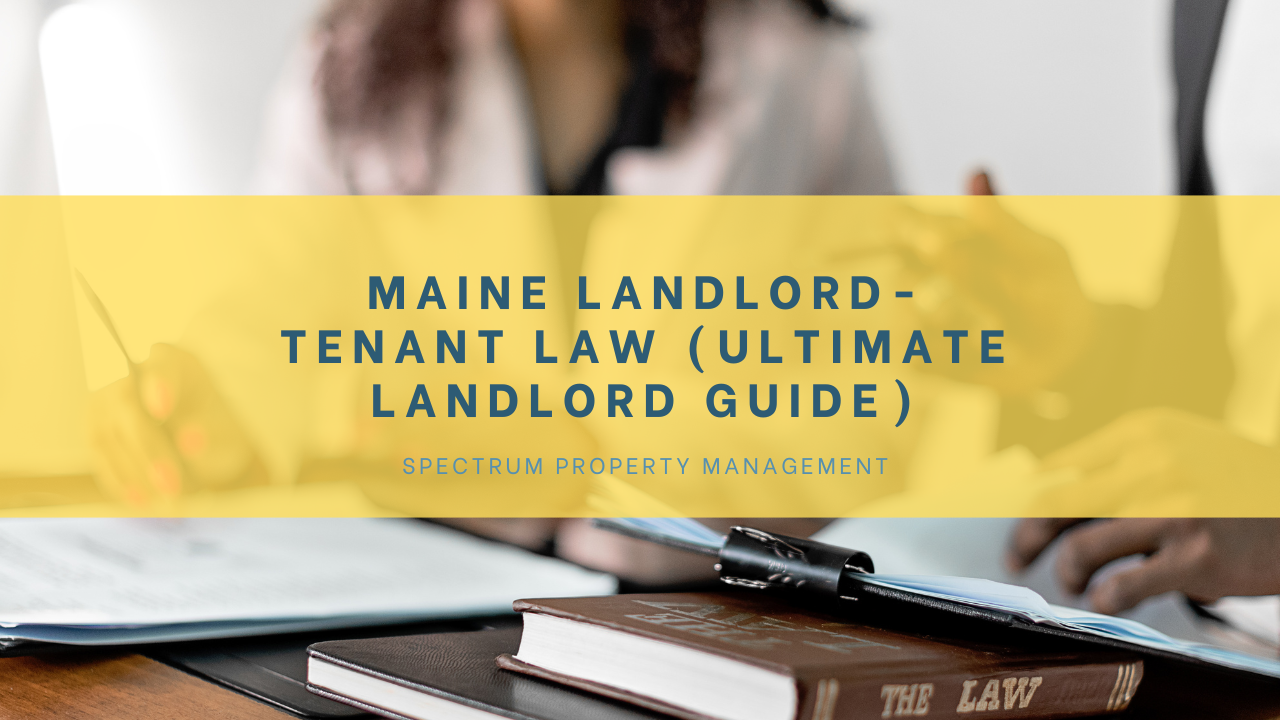Maine Landlord-Tenant Law (Ultimate Landlord Guide)
Key Takeaways
- Leases and disclosures are essential: Maine law requires leases to clearly outline terms like rent, fees, and maintenance while also including important disclosures, such as radon test results, bedbug history, smoking policy, and (in Portland) a tenant rights notice.
- Security deposits have strict rules: Landlords can generally collect up to two months’ rent as a deposit, which must be returned within 21–30 days, depending on the lease type.
- Evictions and notices must follow legal process: Landlords may issue a 7-day notice for nonpayment or serious lease violations, and a 30-day notice for ending month-to-month tenancies. Entry into rentals requires reasonable advance notice, and self-help evictions are prohibited.
Because housing is such a fundamental need for human survival and well-being, landlord-tenant relationships are one of the most-regulated aspects of business dealings.
In Maine, relationships between landlords and their tenants are governed by the Residential Landlord and Tenant Act.
This Act contains a list of regulations covering all aspects of rental properties, as far as the rights and responsibilities of landlords and tenants are concerned.
In this article, the experts at Spectrum Properties of Maine will explain key aspects of Maine Landlord-Tenant Law that property investors must understand. The law addresses a range of issues that can arise in a rental property and outlines the procedures for resolving them.
Knowing what the law says about your relationship with tenants ensures that the tenancy runs smoothly with minimal risk of litigation.
HOW MUCH IS YOUR RENTAL WORTH?
BOOK A CONSULTATION TODAY.
Maine Rental Laws: An Overview of Landlord-Tenant Rights in Oakland
The Lease Agreement
The landlord-tenant relationship is anchored on the lease agreement. This is a legally-binding contract between the landlord and tenants that outlines the terms of the agreement.
It spells out each party’s rights and responsibilities, along with the consequences of violating the lease terms.
The lease agreement must specify the length of the lease and when it terminates.
Because any violation of the lease can attract hefty fines once it is signed, it is vital to include necessary details in the document and ensure that both parties understand the document before signing it. Most times, the lease agreement is a one-year fixed contract, but it can also be based on a month-to-month lease.
The lease should include details like the rent amount, due date for the rent, late-fee policies, pet policies, pest control, snow removal, yard maintenance, and other important details.
Required Disclosures
There are a total of eight important disclosures that Maine landlords are required to include in the lease agreement under the Residential Landlord and Tenant Act, namely:
- Bedbug infestation disclosure: If the rental unit or an adjacent unit has bedbugs or is being treated for bedbugs, landlords must inform tenants. If a tenant requests it, landlords must disclose the last date the unit or adjacent units were inspected and found to be free of bedbugs.
- Energy efficiency disclosure: Landlords must provide disclosure of the energy efficiency of the building’s systems (water heater, insulation, etc.) and appliances.
- Electricity to common areas: Landlords may not bill tenants for electricity, and any utility or service for the common areas of the rental, unless the tenant agrees to it.
- Security deposit location: Landlords have a legal obligation to disclose the bank name and account number where the tenant’s security deposit is being held.
- Smoking policy: Landlords must disclose whether smoking is allowed or prohibited on the property. If allowed, they must disclose where it is permitted or not permitted.
- Radon disclosure: Every ten years, landlords must test the rental for the presence of radon and disclose the test results to both prospective and existing tenants. Along with the test results, the disclosure must include the date of the test and the risks associated with radon exposure, as contained in the disclosure form from the Department of Health and Human Services.
- Lead-based paint disclosure: If the rental property was built before 1978, landlords must provide tenants with a lead-based paint disclosure and pamphlet.
- Rental Housing Rights Disclosure: Landlords must provide tenants with a one-page document informing them of their rights as renters. This only applies in the City of Portland.
Security Deposit Laws
In Maine, if a landlord has more than 5 rental units, they can only charge a maximum of the equivalent of two months’ rent for the security deposit. For landlords with 5 or fewer rental units, there is no limit on how much they can charge as the security deposit.
For fixed-term leases, the security deposit must be returned within 30 days of the end of the tenancy. For month-to-month leases, however, the security deposit must be returned no later than 21 days from the end of the tenancy.
Maintenance and Repairs
The landlord must maintain the property in a safe and habitable condition at all times. They must carry out repairs within 14 days of being notified of an issue.
If the landlord fails to make repairs, tenants have the right to withhold rent, seek legal counsel, or make the repairs. If tenants make the repairs, they have the right to deduct the expense from the rent, up to $500 or half of the rent amount.
Eviction Laws
Maine tenant laws allow landlords to evict tenants under the following requirements:
- Non-payment of rent: If tenants are late with the rent, landlords may issue a 7-day notice to quit.
- Non-compliance: Landlords may issue a 7-day notice to quit to tenants who break the lease agreement. Depending on the breach, the notice period may shift. Be sure to consult a property manager or attorney.
- Termination: Landlords are allowed to terminate a month-to-month lease for reasons other than non-payment of rent and non-compliance, but they must give the tenant a 30-day notice.
When trying to evict a tenant for any of the above reasons, landlords must follow the established procedures for dealing with such issues.
They cannot resort to self-help eviction methods such as changing the door locks in a rental property or shutting off the utilities.
HAVE A QUESTION?
ASK A PROPERTY MANAGER.
Other Important Landlord-Tenant Laws
- Notice to enter: Except during emergencies, landlords must provide tenants with a 24-hour notice before entering the property.
- Late fees: Landlords are not allowed to charge a late fee unless the rent is at least 15 days late. Late fees cannot exceed 4% of the monthly rent.
- Insurance requirements: Landlords can require tenants to get renters’ insurance. If a tenant fails to do this, it may be a breach of the lease agreement, provided insurance is required by the lease terms.
- Returned payment fees: For bad cheques received, landlords must provide tenants with a written notice of the bad cheque, including details of the cheque and a warning of possible penalties.
- Ending & renewing the lease: Fixed-term leases terminate at the end of the lease period, unless the lease says otherwise. Month-to-month leases can be terminated by either party with a 30-day notice.
- Rent increases: Maine does not have state-wide limits for rent increases, but the City of Portland does have laws in place that set limits for annual rent increases.
Bottom Line
When creating a lease agreement and management plan for your rental unit, these laws help to establish trust with tenants. Tenant laws should not be viewed as a hassle; following them helps to ensure minimal conflict with tenants throughout their tenancy.
At Spectrum Properties of Maine, excellence in property management goes hand-in-hand with legal diligence.
Our full suite of services—from residential and commercial property management to tenant placement, project oversight, HOA support, and consulting—ensures every landlord’s needs are met with professionalism and compliance.
Armed with a deep understanding of the Maine Residential Landlord and Tenant Act, including mandatory security deposit handling, disclosure obligations, and proper eviction procedure, Spectrum Properties ensures your properties thrive—while minimizing legal risk and maximizing peace of mind.
Reach out to us today to see how we can help you.
CONTACT US TODAY!
LET’S GET STARTED.
Disclaimer: Please note that the information provided in this blog is intended for general guidance and should not be considered as a replacement for professional legal advice. It is important to be aware that laws pertaining to property management may change, rendering this information outdated by the time you read it.



